Why You Need AI for Citations
As scholars, professionals, and content creators, we are all bound by one common rule: the need to cite our sources accurately. Yet, citation styles are finicky, the volume of sources overwhelming, and tracking everything manually can quickly become a nightmare. This is where AI reference finders can revolutionize the process.
Table Of Content
- Why You Need AI for Citations
- How AI Reference Finders Work
- Top AI Tools for Citations and Reference Management
- Trinka AI: More Than Just a Citation Generator
- Paper Digest: Summarizing and Citing Made Simple
- Scite AI: Verifying Citations with AI
- CiteThisForMe: A Mobile-Friendly Citation Tool
- Zotero: A Free and Open-Source Research Manager
- CiteFast: Quick Citation Generator
- BibGuru: Instant Citation Generation for Students
- MyBib: Free Citation Tool for Books, Articles, and Websites
- Citation Machine: AI-Powered Citation and Grammar Check
- Best Practices When Using AI for Citations
- Conclusion
- FAQs
- 1. How do AI citation tools work?
- 2. Are AI citation tools reliable for academic writing?
- 3. Do citation tools support different citation styles?
- 4. Can AI replace manual citation checking?
- 5. What are the benefits of using AI for finding references?
- 6. Are AI citation tools free?
- 7. Is using AI for citations ethical?
Here’s how AI simplifies citation management:
- Time-saving: No more manually hunting down references or cross-checking citation styles.
- Accuracy: AI tools automatically format citations based on specific styles like APA, MLA, or Chicago.
- Efficiency: With AI, the chances of missing a citation or incorrectly formatting one are drastically reduced.
- Comprehensive: These tools often offer more than citation support—they can help you find the right references as well.
To make the most of AI for citations, let’s explore the top tools available today.
How AI Reference Finders Work
AI reference finders use advanced natural language processing (NLP) and machine learning algorithms to automatically identify and extract relevant citations from large volumes of text. Here’s a high-level overview of how these systems work:
- Text Ingestion: The AI system first ingests the full text of research papers, articles, books, or other documents from which citations need to be extracted.
- Preprocessing: The ingested text is preprocessed to clean and structure the data, removing any formatting inconsistencies, and converting it into a machine-readable format.
- Named Entity Recognition (NER): NLP algorithms are used to identify and classify named entities within the text, such as author names, publication titles, dates, and other bibliographic information.
- Context Analysis: The AI system analyzes the context surrounding the identified named entities to determine if they are part of a citation or reference.
- Pattern Matching: Machine learning models are trained on large datasets of correctly formatted citations to recognize common patterns and structures used in different citation styles (e.g., APA, MLA, Chicago, etc.).
- Citation Extraction: Based on the identified named entities, context analysis, and pattern matching, the AI system extracts complete citations or references from the text.
- Citation Formatting: The extracted citations are then formatted according to the desired citation style, ensuring consistency and adherence to the appropriate guidelines.
- Output Generation: The formatted citations are then compiled and presented to the user, often integrated into a reference management tool or word processor.
Top AI Tools for Citations and Reference Management
With numerous AI citation tools emerging, it’s important to select the one that fits your specific needs. Below are some of the most efficient AI tools designed to help with citing and finding references:
| Tool | Main Feature | Additional Benefits |
|---|---|---|
| Trinka AI | Comprehensive writing assistant with built-in citation generation. | Offers grammar checks, style improvement, and enhanced citation tools to ensure academic integrity. |
| Paper Digest | AI-driven tool that provides summaries of academic papers and helps find citations. | Saves time by summarizing complex papers and organizing them with relevant citations. |
| Scite AI | Verifies citations by showing how a paper has been cited by others, helping you avoid incorrect or dubious references. | Provides in-text citation insights, allowing you to see the context in which a source has been referenced. |
| CiteThisForMe | A user-friendly citation generator that supports multiple styles such as APA, MLA, and Chicago. | Allows you to scan book barcodes or manually input references to generate accurate citations on the go. |
| Zotero | A free, open-source research tool that helps you collect, organize, cite, and share research. | Syncs across devices, making it easy to store and access your research library from anywhere. |
| CiteFast | A free, fast citation generator that offers instant citation formatting. | Provides citation management for books, websites, and journals, with the ability to save and organize citations for later use. |
| BibGuru | A citation generator designed for students that allows instant generation of citations in multiple formats. | Includes an easy-to-use interface, making it ideal for students or casual researchers needing fast citations without much setup. |
| MyBib | A free citation generator that supports various styles, allowing users to create citations for books, articles, and websites. | Provides quick and easy citation generation with simple search functions for gathering references. |
| Citation Machine | An AI-driven citation tool that supports MLA, APA, and other popular citation styles. | Features a quick copy-paste function for citations and offers grammar checks as well. |
Trinka AI: More Than Just a Citation Generator
Among the AI tools, Trinka AI stands out for its ability to serve as a complete writing assistant, which includes a robust citation generator.
Unlike traditional citation tools, Trinka AI doesn’t just give you preformatted citations—it helps you improve your writing style, checks for consistency, and even provides suggestions for better academic language.
This is how Trinka AI’s citation tool works:
- Input the reference details, and Trinka automatically generates the citation in the style you need.
- Grammar and punctuation checks ensure that even your citations are error-free.
- In-text citation suggestions to make sure nothing is left out of your manuscript.
Paper Digest: Summarizing and Citing Made Simple
Need a quick summary of an academic paper and relevant citations? Paper Digest offers a streamlined solution. Using advanced AI, Paper Digest helps summarize complex research papers while also offering citations and relevant references.
Here’s why Paper Digest is a game-changer for citation management:
- Instant summaries: Summarizes papers into digestible content, making it easier to determine if they’re worth citing.
- Automatic reference generation: It provides a list of related papers and creates citations for each.
- Quick literature review tool: Ideal for writing literature reviews, saving you hours of manual research.
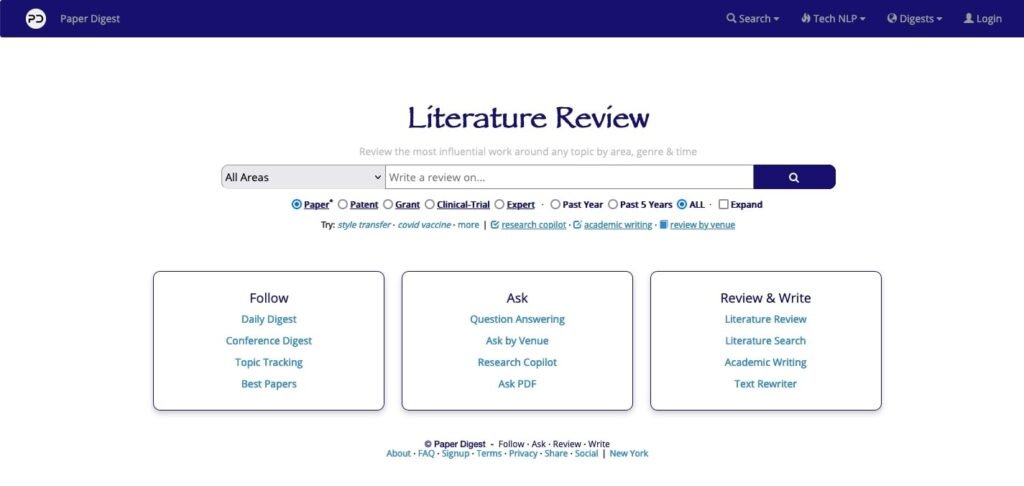
Scite AI: Verifying Citations with AI
One of the most unique tools in the market is Scite AI. It doesn’t just help with finding and generating citations; it also verifies how papers are cited by others. With Scite AI, you can avoid using unreliable or misinterpreted references by getting a real-time analysis of how a paper has been cited in different contexts.
Why use Scite AI:
- Citation context analysis: See how often and in what context your sources have been cited.
- Avoid bad citations: Helps you filter out sources that may not be as reputable or widely accepted in the academic community.
- Insightful metrics: Get detailed statistics about citations, including whether the citations support, contradict, or mention your research.
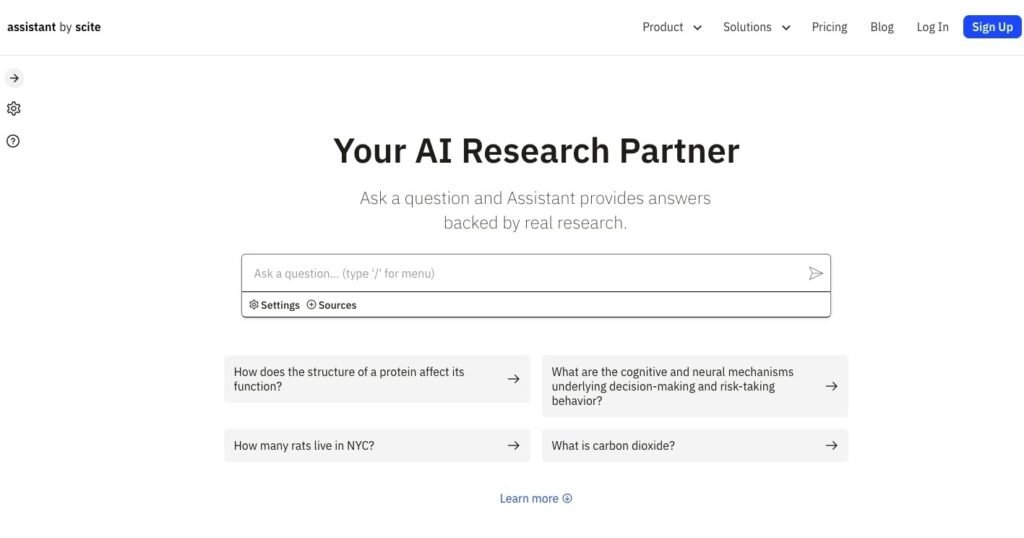
CiteThisForMe: A Mobile-Friendly Citation Tool
CiteThisForMe is a simple, user-friendly AI tool designed to quickly generate citations. One of its standout features is the ability to scan book barcodes using your phone’s camera to automatically create citations. Whether you’re on the go or working from your desk, CiteThisForMe makes it easy to format references in APA, MLA, Chicago, and more.
What makes CiteThisForMe valuable:
- Mobile support: Create citations using your phone by scanning barcodes.
- Fast citation generation: Input reference details, and CiteThisForMe will generate citations in seconds.
- Wide citation style support: Whether you’re writing in APA or Chicago style, it has you covered.
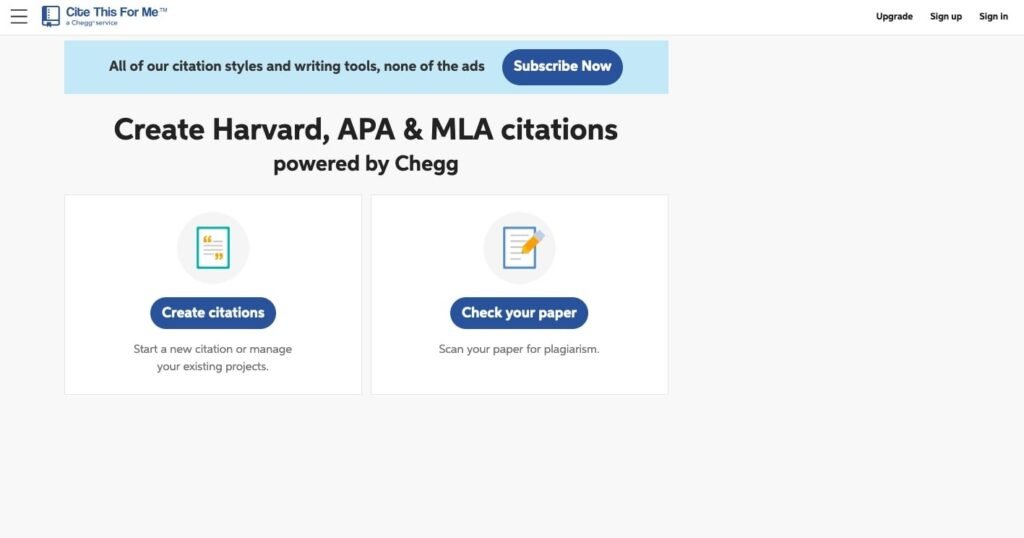
Zotero: A Free and Open-Source Research Manager
Zotero is a comprehensive, open-source tool for managing references, organizing research, and sharing sources. While it isn’t solely focused on citation generation, it excels at helping you build and manage a research library that can be used for automatic citation in multiple styles.
Zotero’s strengths include:
- Cross-device synchronization: Store your references in the cloud and access them from any device.
- Browser extension: Quickly add references from academic databases and websites directly to your Zotero library.
- Integration with Word and Google Docs: As you write, Zotero can automatically generate citations and bibliographies.
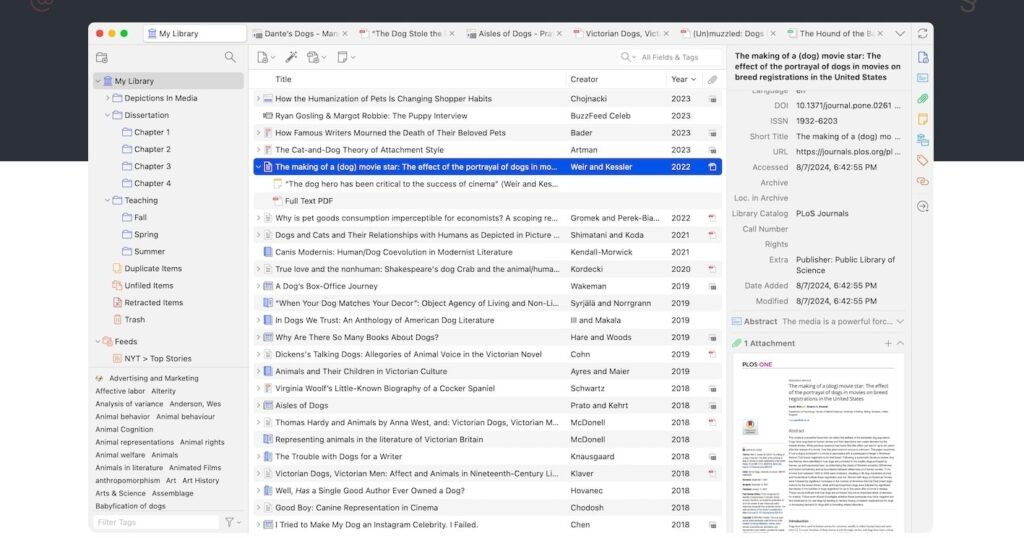
CiteFast: Quick Citation Generator
If speed is what you need, CiteFast is an ideal solution. This free, no-frills citation tool allows users to generate citations for books, articles, and websites in seconds. It’s designed to make the process as fast and efficient as possible, with the ability to store citations for later use.
CiteFast’s standout features:
- Simple interface: No complicated features—just fast and accurate citation generation.
- Multiple format support: Works with popular citation styles like APA, MLA, and Chicago.
- Save for later: Store your citations to come back and retrieve them when needed.
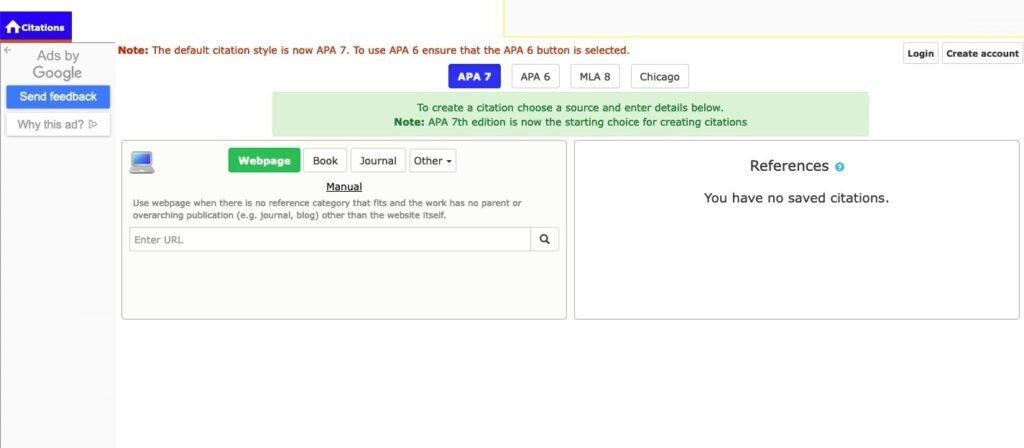
BibGuru: Instant Citation Generation for Students
Designed with students in mind, BibGuru is a free citation generator that offers a simple, easy-to-use interface. Whether you’re writing a term paper or a thesis, BibGuru allows you to quickly generate citations in APA, MLA, Chicago, and other popular formats.
Why students love BibGuru:
- Instant citations: Type in the title or author, and BibGuru generates the citation immediately.
- Simple interface: Perfect for students who need quick and easy access to citation tools.
- Multiple formats supported: Generate citations in the most common academic styles.
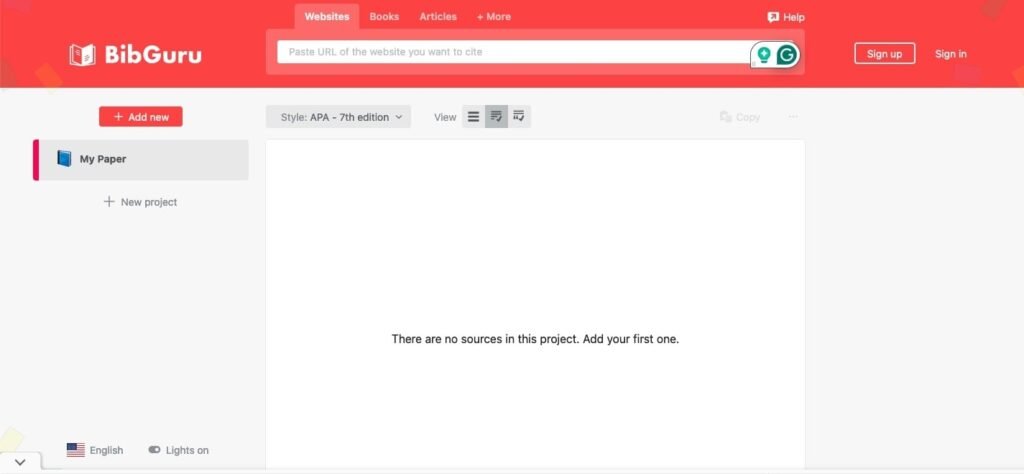
MyBib: Free Citation Tool for Books, Articles, and Websites
MyBib is another free citation generator that allows users to create accurate citations for books, articles, and websites in multiple styles. The tool features a simple search function, allowing you to type in a book title or article, and it will retrieve and generate a citation for you.
Why use MyBib:
- Free to use: No subscriptions or payments required.
- Multiple citation formats: Supports APA, MLA, Chicago, and more.
- Fast reference finding: Quickly generate citations by searching for the title or author.
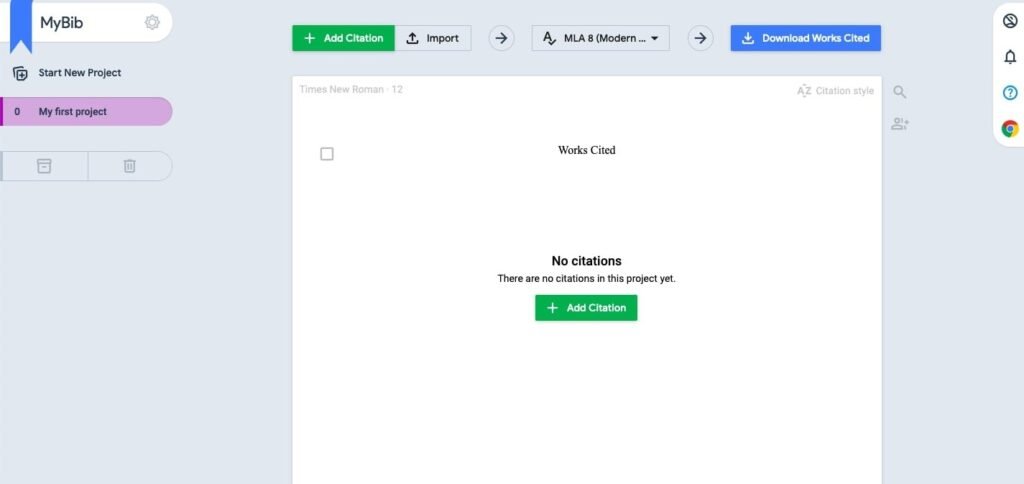
Citation Machine: AI-Powered Citation and Grammar Check
Citation Machine is an AI-powered citation tool that not only helps with generating references but also offers grammar and writing suggestions. With support for APA, MLA, and other citation styles, Citation Machine helps streamline the writing process by offering both citation and grammar improvements in one place.
Citation Machine’s key features:
- Citation generation: Easily create accurate citations for a wide range of source types.
- Grammar and spelling checks: Improve your writing with AI-driven grammar suggestions.
Supports multiple styles: Choose from APA, MLA, Chicago, and more for your citations.
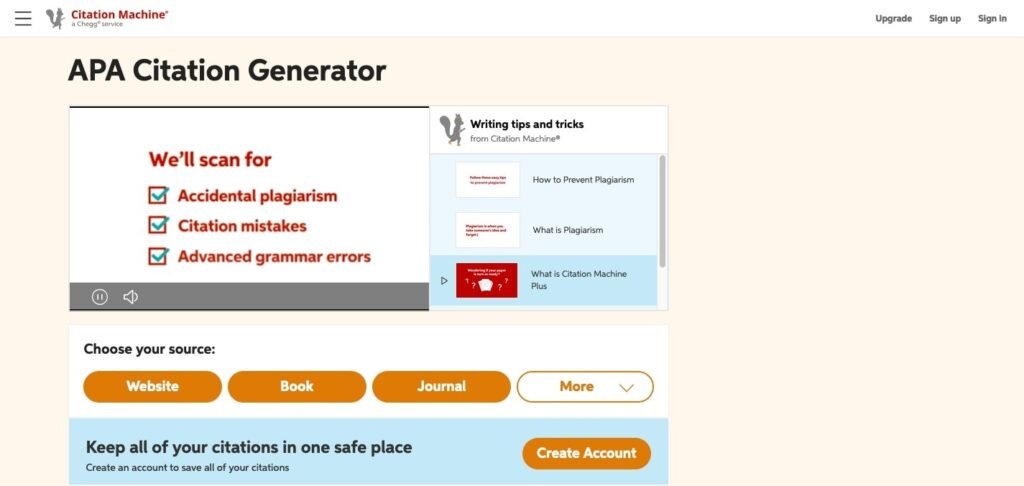
Best Practices When Using AI for Citations
While AI can significantly improve the citation process, following best practices ensures you’re using these tools effectively:
- Always Verify References
AI can suggest references, but it’s always good to manually verify that they’re relevant and correctly cited. Don’t rely solely on AI suggestions.
- Use the Right Citation Style
AI tools can handle various citation styles, but ensure you’re using the right one for your field (APA, MLA, Chicago, etc.). Double-check formatting for accuracy.
- Avoid Over-Reliance
While AI can do a lot, it’s essential to maintain a critical eye over your references to avoid including irrelevant or outdated sources.
Conclusion
The availability of AI for citations has revolutionized the way students, researchers, and professionals handle citation management. With powerful tools like Trinka AI and Zotero, the days of manual citation generation and reference management are behind us. Whether you need fast citations, collaboration tools, or advanced reference organization, AI tools have something to offer for every kind of user.
If you’re looking to streamline your writing process, these AI tools provide not only speed and accuracy but also the peace of mind that your citations are both reliable and properly formatted.
FAQs
1. How do AI citation tools work?
AI citation tools use algorithms and databases to retrieve and format citation details automatically, making it easier to generate accurate references for academic writing.
2. Are AI citation tools reliable for academic writing?
Yes, most AI citation tools are highly reliable, especially when combined with manual checks. Tools like Scite AI even verify the credibility of the sources cited.
3. Do citation tools support different citation styles?
Most AI citation tools, including Trinka AI and Zotero, support a wide range of citation styles such as APA, MLA, and Chicago.
4. Can AI replace manual citation checking?
While AI can handle most citation tasks efficiently, it’s still a good idea to manually review the final product to ensure everything aligns with specific guidelines.
5. What are the benefits of using AI for finding references?
AI for finding references saves time, ensures credibility by selecting high-quality sources, and helps researchers discover up-to-date information on their topics.
6. Are AI citation tools free?
Many AI citation tools, like Zotero and Citation Machine, offer free versions with basic functionalities. More advanced features may require a subscription.
7. Is using AI for citations ethical?
Yes, using AI for citations is ethical as long as it is used responsibly and enhances the quality and integrity of academic writing.


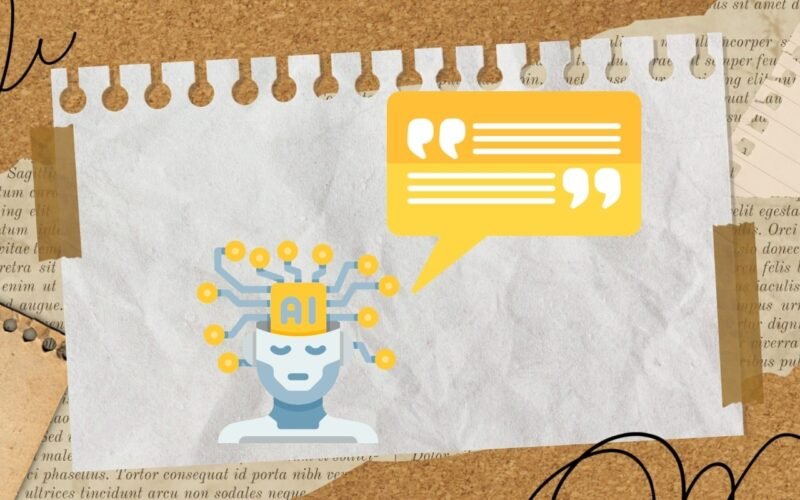
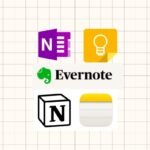




No Comment! Be the first one.